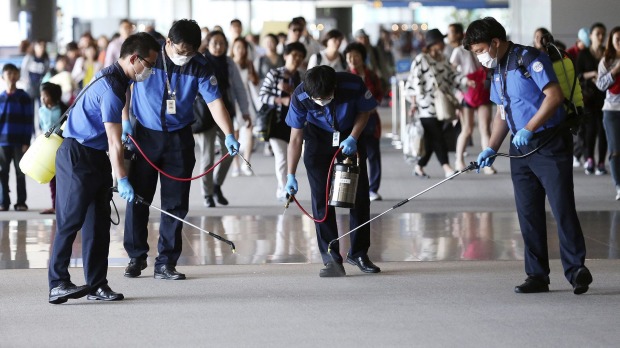
Workers spray antiseptic solution at Incheon International Airport in South Korea on Wednesday. Photo: Shin Jun-hee
- Seul: Alarm over an outbreak of Middle East Respiratory Syndrome (MERS) in South Korea spread on Thursday with North Korea calling for border checks while hundreds more schools closed in South Korea as authorities reported five new cases in one day.
South Korean President Park Geun-hye has demanded that everything to be done to halt the outbreak which began two weeks ago, brought into the country by a South Korean man returning from a business trip to the Middle East.

People wearing face masks outside the Gyeongbokgung palace in Seoul on Wednesday. Photo: Ed Jones
Two people have died in South Korea. With 35 cases confirmed by Thursday, South Korea has the most infections outside the Middle East where the disease first appeared in 2012, and where most of the 440 fatalities have been.
About 1600 people have been quarantined in South Korea, most of them at home or in medical institutions, a health ministry official said.
Among the five new South Korean cases were two more health workers who treated infected patients.

A woman believed to be infected with MERS lies on a stretcher in quarantine in Seoul. Photo: Reuters
“We are in a war,” said an official at a health centre in Seoul’s wealthy Gangnam district, where panic spread early on Thursday when medical workers in protection suits were spotted near a hotel.
The official said a Middle Eastern guest at the hotel fell ill and was later confined in quarantine at a hospital.
“I saw some people dressed in scary white spacesuits on the street,” said a 30-year-old woman resident of Gangnam.

Students wearing face masks wait to cross a street in Seoul on June 3. Photo: Ed Jones
MERS infection is caused by a coronavirus from the same family as the one that caused SARS, or Severe Acute Respiratory Syndrome (SARS), which emerged in 2002-2003 and killed around 800 people worldwide.
MERS has a much higher death rate – 38 per cent, according to WHO figures – but also spreads far less swiftly than SARS from person to person, making it less of a threat for now.
North Korea had asked the South to provide heat-detecting cameras to monitor temperatures of South Korean workers travelling to the inter-Korean Kaesong Industrial Complex, just north of the border, a South Korean government official said.
South Korea lent North Korea three cameras to use at the complex during the recent scare over Ebola, the official said.
South Korean authorities have been criticised for being slow to respond to the initial spread of MERS.
It took several days for the 68-year-old man returning from the Middle East to be diagnosed with MERS and in the meantime, he infected people at health facilities where he went for treatment of a fever and cough.
All of South Korea’s cases have been traced to the man who visited Saudi Arabia and the United Arab Emirates, the countries with the most MERS cases.
China last week reported its first case, that of a South Korean man who tested positive after breaking a voluntary house quarantine and travelling to Hong Kong and on to mainland China.
More than 700 schools in South Korea were closed or had classes cancelled as of Thursday, the Ministry of Education said.
While there has been no sustained human-to-human transmission, the worst-case scenario would be for the virus to change and spread rapidly.
South Korea’s new cases bring the total number globally to about 1180, based on World Health Organisation (WHO) data, with at least 442 related deaths.
